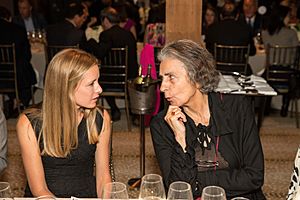Laura Nader facts for kids
Quick facts for kids
Laura Nader
|
|
|---|---|

Nader (right) in 2013
|
|
| Born | September 30, 1930 Winsted, Connecticut, U.S.
|
| Education | Wells College (BA) Radcliffe College (PhD) |
| Occupation | Anthropologist |
| Parent(s) | Rose Nader (mother) |
| Relatives |
|
| Awards | See below. |
| Scientific career | |
| Institutions | University of California, Berkeley |
| Doctoral advisor | Clyde Kluckhohn |
Laura Nader, born on February 16, 1930, is a famous American anthropologist. An anthropologist is a scientist who studies human societies and cultures. She has been a professor of anthropology at the University of California, Berkeley, since 1960. She was the first woman to get a permanent teaching job in her department there. She is also the older sister of well-known U.S. activist Ralph Nader. Her siblings, Shafeek Nader and Claire Nader, are also involved in public service.
Contents
Discovering Anthropology
Laura Nader grew up in Winsted, Connecticut. Her father, Nathra, owned a store that was a popular spot for political discussions. Her mother, Rose Nader, was a teacher who cared deeply about fairness and justice. Laura's family, including her brothers Shafeek and Ralph, and her sister Claire, all chose careers focused on helping others.
Laura Nader earned her first degree in Latin American Studies from Wells College in 1952. She then went on to get her PhD in Anthropology from Harvard University in 1961. During her studies, she did important fieldwork in a Zapotec village in Oaxaca, Mexico. She also conducted research in South Lebanon.
Exploring Cultures and Laws
Nader's research looks at how different cultures handle law and solve problems. She also studies family structures, how professionals think, and the cultures of the Middle East, Mexico, Latin America, and the United States.
She has worked to make the study of law more connected to society. She believes law should not be separate from other parts of life. Nader has written several books on the anthropology of law. This has made her a very important person in this field. She has also taught at famous law schools like Yale, Stanford, and Harvard Law School.
Solving Problems in Different Ways
Some of Nader's work focuses on how people in the Zapotec village solve disagreements. She noticed that people there talk to each other directly to find solutions. Village leaders try to find fair answers instead of blaming just one person. Nader believes this way of solving problems reflects their society and how it is organized.
In contrast, she found that in the United States, disagreements often lead to strong blame and conflict. People might have to face large, powerful groups. Nader thinks that the types of cases people bring to court show where there is stress in a community's social structure.
Understanding Harmony Ideology
Nader has written a lot about "harmony ideology." This is the idea that conflict is always bad, and a healthy society should avoid it. In her book Harmony Ideology, she suggests that missionaries spread this idea to colonized people. This helped with military takeovers.
However, Nader says the Zapotec people used harmony ideology in a different way. They seemed to be "harmonious" on the surface, but they were actually dealing with many legal issues behind the scenes. Nader believes this helped the Zapotec keep some control over their own lives from the Mexican government.
Nader also argues that harmony ideology has influenced some legal ideas in the U.S. since the 1960s. For example, the idea of "litigation explosions" (too many lawsuits) and Alternative Dispute Resolution (ADR) came about. ADR tries to move cases out of court into a setting that focuses on agreement and compromise, rather than justice.
Nader's career started with an interest in law and social control. Over time, she became more interested in how culture controls people. She even created the term "trustanoia." This is the opposite of paranoia. It describes how Americans often trust that someone will always take care of them, including politicians.
The Idea of "Studying Up"
One of Nader's most famous ideas came from her 1969 article, "Up the anthropologist--Perspectives gained from studying up." In this article, she encouraged anthropologists to study powerful groups, not just those who are less powerful. She wanted them to look at the "culture of power" instead of only the "culture of poverty." This idea influenced many anthropologists to "study up."
Awards and Recognition
Laura Nader has received many awards for her important work:
- Morgan Spanish Prize, Wells College
- Wells College Alumnae Award
- Radcliffe College Alumnae Award
- Center for Advanced Study in the Behavioral Sciences
- Woodrow Wilson Center for Advanced Study in Washington, D.C.
- Harry Kalven Prize (1995), Law and Society Association
- American Anthropological Association, Distinguished Lecture Award (2000)
- CoGEA (Committee on Gender Equity in Anthropology) Award (2010)
Films Featuring Laura Nader
- To Make the Balance (1966) – 33 min.
- Little Injustices- Laura Nader Looks at the Law (1980) – 60 min.
- Losing Knowledge: Fifty Years of Change (2011) – 40 min.
See also
 In Spanish: Laura Nader para niños
In Spanish: Laura Nader para niños

